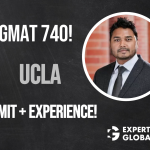Verbatim
Experts’ Global: Hi Murtuza, thank you for joining us today! Could you share your journey with our readers?
Murtuza: My name is Murtuza, and I hail from Mumbai. With an undergrad background in Electrical Engineering, I worked at Siemens in product development for three years and went on to begin my seven-year entrepreneurial journey to deliver capital goods and consumables to regional industries thereafter. At that stage, an MBA seemed the natural next step in my growth and a good way for me to tap into analytics-driven decision-making paradigms. I completed my MBA at Carnegie Mellon, and have since been working at Amazon.
Experts’ Global: In your opinion, what decisions contributed to your success?
Murtuza: My constant desire to keep pushing the status quo in my life helped. Whether it be a job change, a move towards building your own business, or finally deciding to take the MBA leap, any change in your evolution involves risk. The pandemic, in particular, showed us all that risk is a part of our daily lives.
In my case, many peers told me that it was too late for me to do an MBA and that I was risking a growing business for nothing. Self-belief was key, as was the humility to network with and learn deeply from my MBA peers.
Experts’ Global: In hindsight, what mistakes did you make along the way?
Murtuza: I definitely think I should have started my MBA journey earlier. I began my GMAT prep in 2016 and secured my MBA admission in 2018. Had I started my prep earlier, I could have had an MBA in hand two years previously. Further, while I initially set aside a year to study for and ace the GMAT, it ended up taking me a year and a half to do so. I did not account for the fact that it took me more than one attempt to get a good GMAT score.
From an application standpoint, I think that you should try and figure out what kind of approach works best for you and then just go with that. This also applies to GMAT prep. Try out different media such as one-on-one coaching, GMAT prep online, or prep books, but remember to pivot quickly if something does not work for you.
Experts’ Global: What resources did you use for your GMAT prep and what advice do you have for other aspirants about the same?
Murtuza: I started off by using prep books for my GMAT studies. I also used a free GMAT practice test here and there, and referred to other free resources online. However, this was not an optimal manner of studying, and my research for a better solution led me to Experts’ Global’s end-to-end GMAT prep suite. At this point, I was a year into my GMAT prep, and wanted to expedite the process. Experts’ Global’s aid proved truly useful, as did their weekly check-ins to see if I was hitting progress milestones.
Balancing the effort you spend on Verbal and Quant respectively is also challenging. GMAT mocks can help you identify which section is your strongest point, and after a while, you tend to focus on pushing the needle in your weaker conceptual areas. On my initial mock attempts, I scored a 690 which was something I knew I could improve on. Deciding to focus my energies on my Verbal prep, which was my weak area, I eventually rose to the 720-740 range on mocks. My first GMAT attempt only got me a 690, but I was undeterred, and on my second GMAT attempt a fortnight later, I scored a 740.
Experts’ Global: How was your business school interview experience?
Murtuza: The MBA interview experience was fairly straightforward for me. I gave interviews at five different schools, and nowhere did I face any serious curveball questions. I got the impression that an MBA interview is meant to check for red flags that have not been captured in the admissions process itself. As long as your MBA interview prep is in place and you follow a STAR approach in telling your story authentically, you will succeed!
Experts’ Global: What was your MBA experience like?
Murtuza: My MBA experience was great. In the end, I had to choose between the Rice and Carnegie Mellon programs, and the smaller class size and focus on analytics and data-driven decision-making at Carnegie Mellon were the deciding factors for me. My MBA also gave me the freedom to take classes from other disciplines within the university and empowered me to tap into a truly global community. The network that you build at an MBA is one of the biggest takeaways from the program.
Thankfully, I spent the majority of my MBA on campus, and only the last semester was held virtually due to the pandemic. Most of the recruitment activity in our college had already wrapped up by February 2020, which was also fortunate. As a last thought, a lot of the time, MBAs are evaluated on the ROI that they present, which is valid, but it is difficult to quantify the value of the conversations and experiences you have at business school, and the relationships you build therein.
Experts’ Global: How have the pre-application journey and the MBA immersion influenced your evolution as a postgrad?
Murtuza: The GMAT is a strategic test that helps you get your basic math skills in shape and adopt a problem-solving mindset before your MBA begins. Further, the introspection involved in the application process helps you understand yourself better before you leave for your global MBA and encounter a completely different culture. You are also better placed to recognize and leverage your strengths during the program.
I also think that the MBA teaches you the importance of having an open outlook. Business school allows you exposure to almost any industry you can think of, and interest and professional clubs can help you build relevant communities among your MBA peers. Keeping an open mind can also help you pivot quickly to a different path in case your primary ambition post-MBA does not seem close to being realized. The flexibility of the MBA allows you to evaluate different employment paths the same way you categorize different programs during the school shortlisting process.
Experts’ Global: What is your final message to the MBA aspirants reading this?
Murtuza: Believe in yourself! Once you begin the MBA journey, there is nothing to be gained by looking back or entertaining doubts. Whether it be improving your GMAT score by 10 or 20 points or redrafting essays to make them more appealing, as long as you are moving forward and moving in the right direction, you will get there. There are also many resources out there for MBA applicants to rely on. From online forums to peer support to MBA admissions consulting, never be afraid to reach out and ask for help!
Experts’ Global: Thank you for the information you have shared with us today, Murtuza!
Murtuza: No worries!







